For busy recruiters, sales professionals, and lead generators, managing contacts is more than just keeping a list; it's the foundation of every relationship, lead, and placement. Spreadsheets, manual data entry, and scattered notes quickly become unmanageable, leading to missed opportunities and wasted time. The right contact management software transforms this chaos into an organized, efficient system that powers your pipeline. But with so many options available, how do you choose the one that fits your workflow without unnecessary complexity?
This guide cuts through the noise. We've compiled and analyzed the best contact management software solutions, focusing on the practical needs of recruiters and sales professionals. To truly grasp the capabilities of these powerful platforms, you can explore the foundational aspects of customer relationship management basics.
Here, you'll find detailed breakdowns of each platform's features, pricing, and ideal use cases. We'll examine everything from robust, all-in-one CRMs to lightweight tools that live inside your inbox. We will also highlight ProfileSpider, the modern, no-code alternative that lets you build and enrich your contact database with one click, turning a simple list into your most powerful asset.
1. ProfileSpider
ProfileSpider stands out as the best contact management software for professionals who need to build their contact lists from scratch, not just manage existing ones. It’s a modern, no-code AI-powered Chrome extension designed for one-click profile extraction from sources like LinkedIn, GitHub, and professional networks. Instead of tedious manual data entry or complex coding, ProfileSpider automates the critical first step of contact acquisition, making it an indispensable tool for recruiters and sales teams. Its AI instantly analyzes a webpage to detect and extract up to 200 profiles per page, building a high-quality lead or candidate database in minutes.
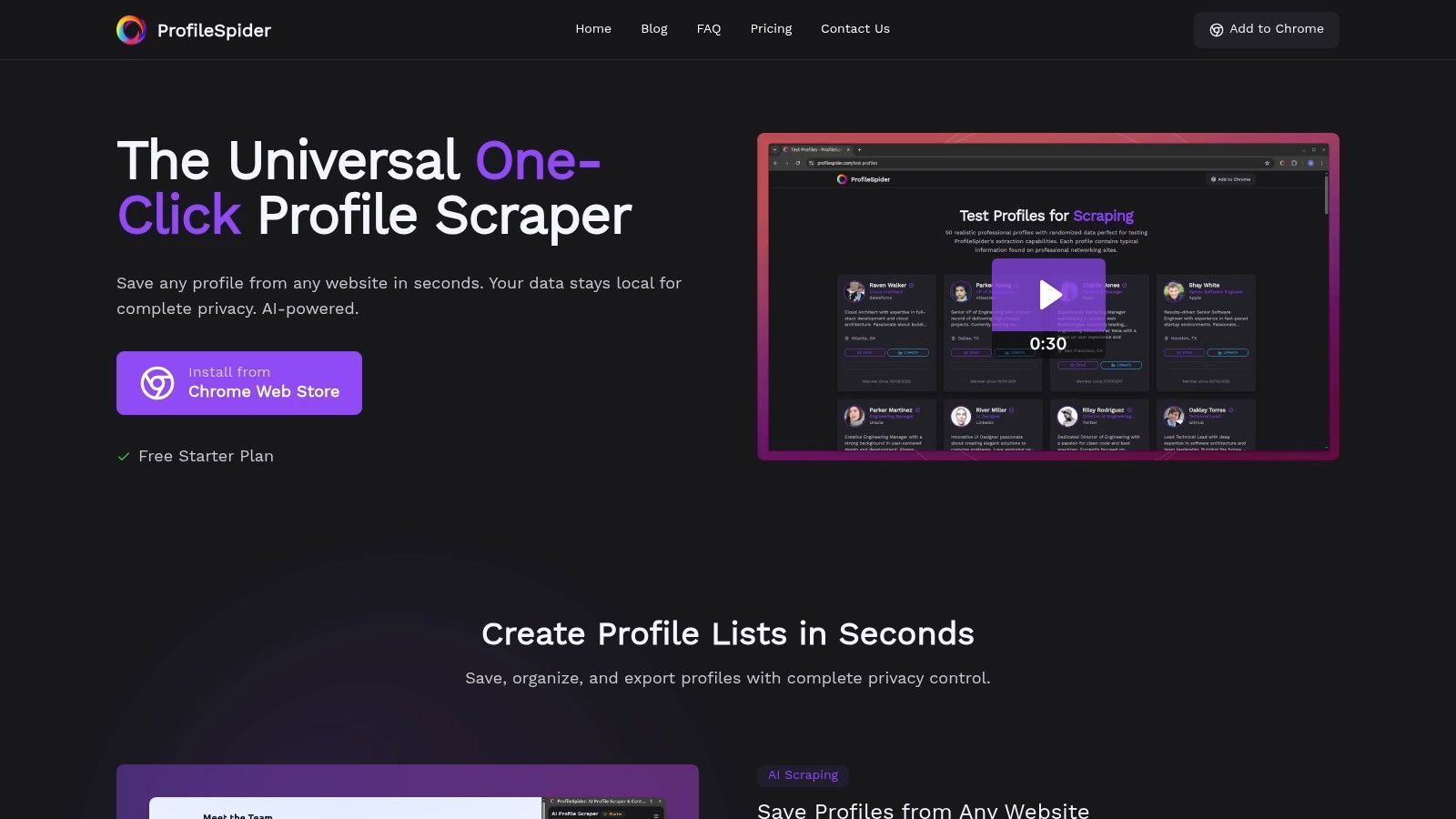
For non-technical users, this is a game-changer. It populates your CRM or ATS with high-quality leads quickly and efficiently. A key differentiator is its privacy-first design; all extracted information is stored locally within your browser, ensuring complete confidentiality. Once collected, you can manage profiles with custom lists, notes, and tags. Flexible export options (CSV, JSON, Excel) allow for seamless integration with virtually any existing contact management software, making ProfileSpider the fastest way to feed your pipeline.
Key Features & Pricing
- One-Click AI Extraction: No-code scraping that intelligently pulls contact data from web pages.
- Local Data Storage: All information is stored securely in your browser, guaranteeing privacy.
- Robust Management Tools: Organize contacts with unlimited lists, notes, and tags directly within the extension.
- Flexible Exports: Download data in CSV, JSON, or Excel with customizable columns for easy system integration.
Pricing is handled through a transparent credit-based system, with a free plan that includes initial credits to get you started. Paid plans are available for higher volume needs.
Pros & Cons
| Pros | Cons |
|---|---|
| Effortless & Fast: Extracts hundreds of profiles in minutes with no setup. | Browser-Specific: Limited to Chrome and Chromium-based browsers. |
| Complete Privacy: Local storage ensures your data remains secure and private. | Credit Tracking: Infrequent users may find credits tricky to manage. |
| Seamless Integration: Versatile export options fit any CRM or sales workflow. | |
| Cost-Effective: Fair credit system with free and affordable tiered plans. |
For recruiters looking to quickly build talent pools, ProfileSpider offers a uniquely efficient approach. You can learn more about how to build a talent pipeline with ProfileSpider and streamline your sourcing.
Website: https://profilespider.com
2. HubSpot Sales Hub
HubSpot Sales Hub has cemented its place as one of the best contact management software options, primarily due to its powerful free tier and seamless scalability. It excels by providing a unified view of every contact, logging emails, calls, notes, and tasks in a clean, chronological timeline. This makes it incredibly easy for sales teams and recruiters to pick up a conversation exactly where it left off, ensuring a consistent and professional experience for every lead or candidate.
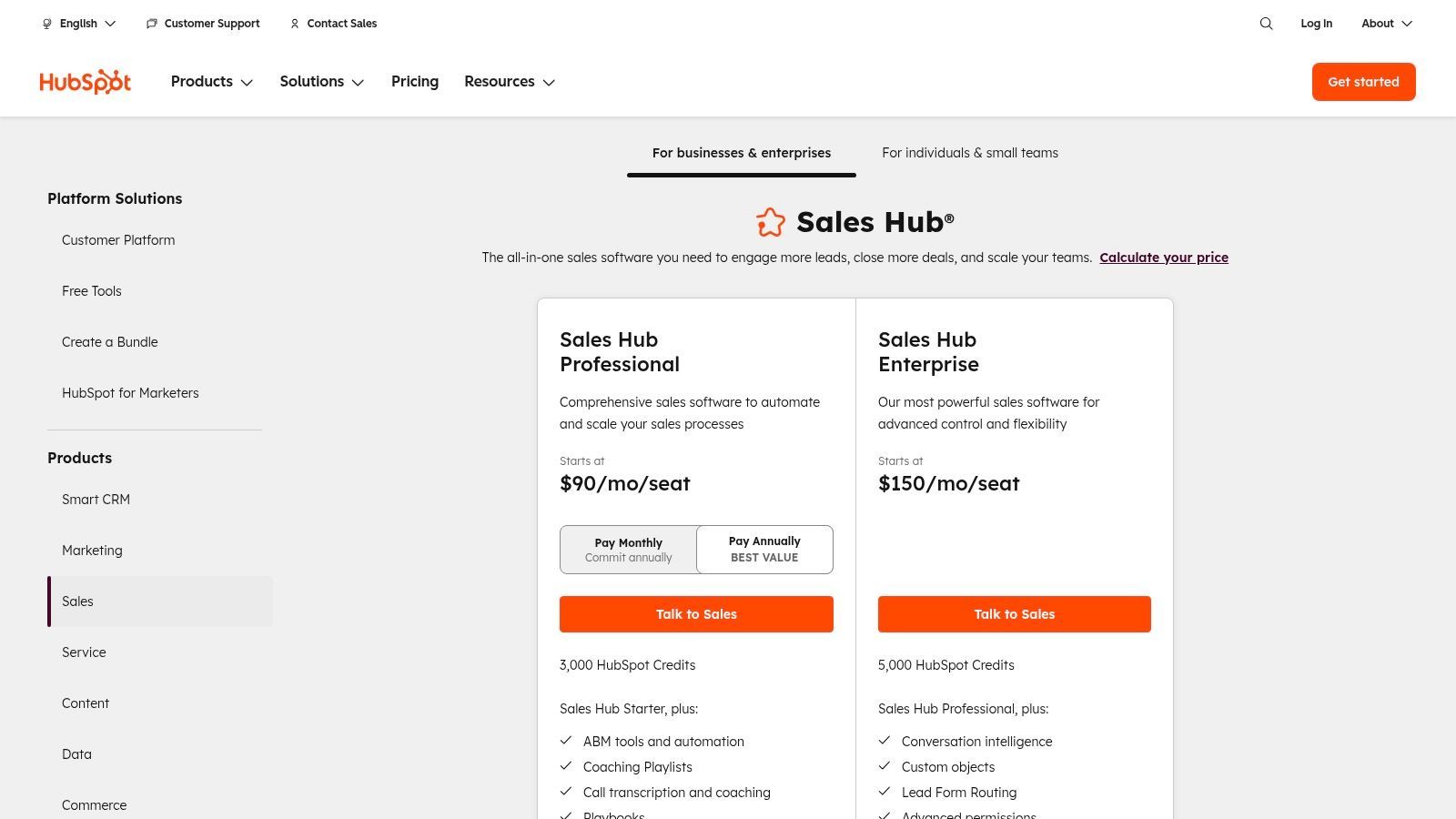
What makes HubSpot stand out is its mature ecosystem. Beyond simple contact storage, it offers powerful tools like email tracking, a meeting scheduler that syncs with your calendar, and a vast marketplace of integrations. Its user interface is intuitive, making adoption straightforward even for less tech-savvy teams. While its feature depth can feel like overkill for basic needs, it’s a platform you can grow into, not out of.
Key Details & Pricing
- Best For: Individuals and teams needing a free, powerful starting point that can scale to enterprise-level functionality.
- Pricing: Offers a robust Free plan. Paid tiers start at $15/user/month (Starter), $500/month for 5 users (Professional), and $1,500/month for 10 users (Enterprise).
- Pros: Generous free plan, excellent UI, massive integration library, strong support and training resources.
- Cons: Paid plans can become expensive quickly, some advanced features are locked behind add-ons, and there is a mandatory onboarding fee for the Enterprise tier.
For those focused on building initial lead lists, understanding how to leverage platforms like HubSpot for AI-driven lead generation can significantly accelerate pipeline growth.
Website: https://www.hubspot.com/pricing/sales
3. Salesforce Sales Cloud
Salesforce Sales Cloud stands as an industry titan, offering one of the most comprehensive and customizable contact management software solutions available. It excels at providing a 360-degree view of every customer, merging contact details with interaction history, sales opportunities, and service cases. This unified approach empowers large teams to manage complex customer relationships with unparalleled depth, ensuring every department is working from the same playbook.
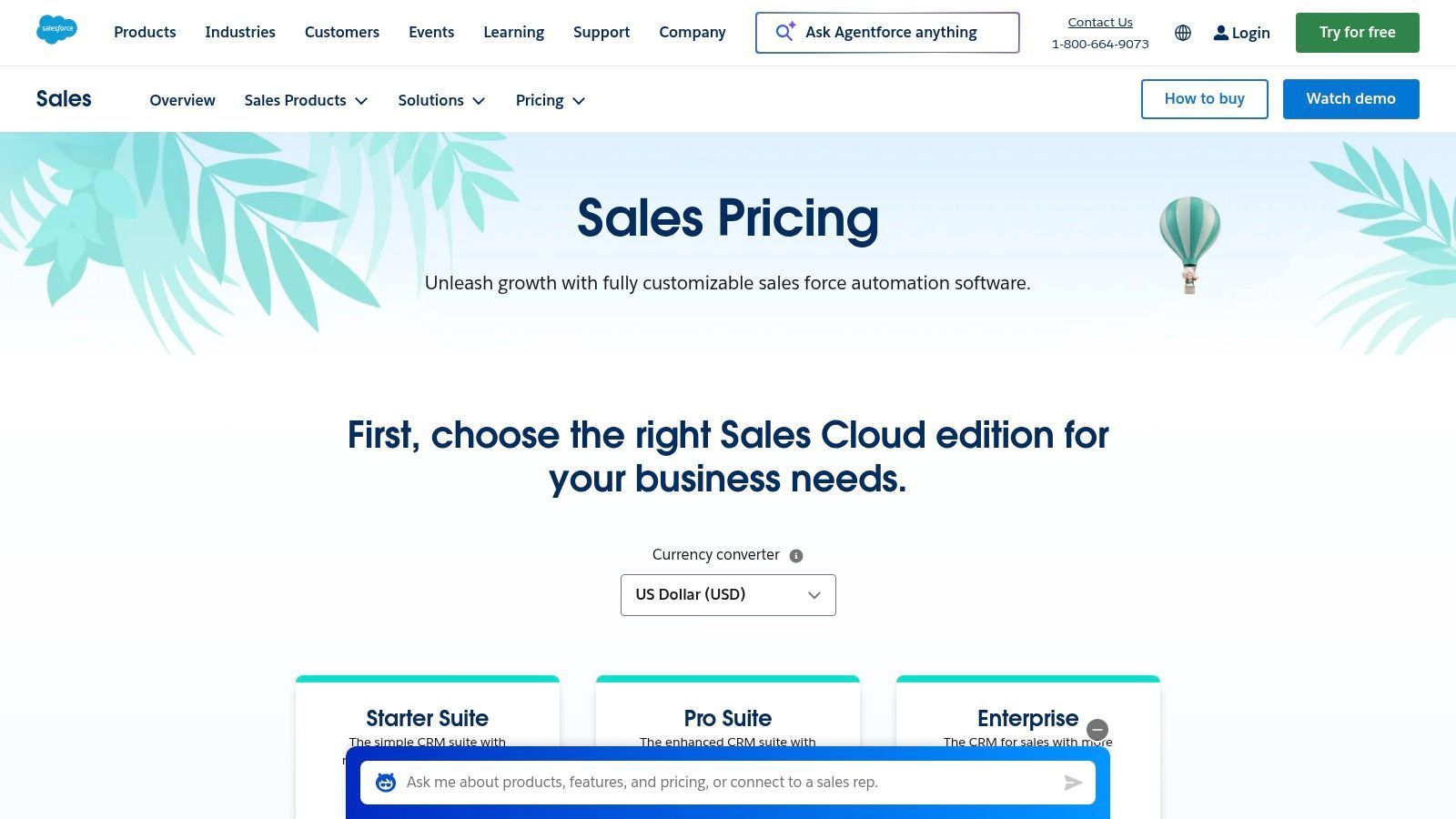
What truly sets Salesforce apart is its sheer extensibility through the AppExchange ecosystem and robust APIs. While its core features for managing contacts, accounts, and leads are powerful, the platform can be molded to fit any business process imaginable. The trade-off for this flexibility is a steeper learning curve and higher administrative overhead compared to simpler tools. However, for organizations that need a platform to scale with their most ambitious growth plans, Salesforce is a definitive choice.
Key Details & Pricing
- Best For: Growing businesses and large enterprises that require deep customization, advanced reporting, and a scalable platform.
- Pricing: Plans start at $25/user/month (Starter Suite), rising to $80/user/month (Professional), $165/user/month (Enterprise), and $330/user/month (Unlimited).
- Pros: Extremely flexible and extensible, industry-leading analytics and governance, vast partner and app network.
- Cons: Steeper learning curve and higher admin overhead, costs can escalate with add-ons and advanced tiers.
Website: https://www.salesforce.com/sales/pricing/
4. Zoho CRM
Zoho CRM is a powerhouse for small and mid-sized businesses, delivering an extensive suite of features at a highly competitive price point. It has established itself as one of the best contact management software options by offering a cohesive ecosystem where contact, lead, and deal management are tightly integrated. The platform provides a clear pipeline visualization, making it simple for recruiters and sales pros to track a contact's journey from initial touchpoint to conversion.
What truly sets Zoho apart is its seamless integration with the wider Zoho product family, including tools for marketing, analytics, and customer support. This creates a unified business operating system that can grow with you. Its workflow automation and lead scoring capabilities, available from the Standard tier, allow teams to automate repetitive tasks and prioritize high-value contacts efficiently. While the interface can feel busy initially due to its depth, the level of customization available makes it a flexible and powerful choice for growing teams.
Key Details & Pricing
- Best For: SMBs and growing teams looking for an affordable, all-in-one CRM with powerful automation and customization.
- Pricing: Offers a Free plan for up to 3 users. Paid tiers include Standard ($14/user/month), Professional ($23/user/month), and Enterprise ($40/user/month).
- Pros: Very competitive pricing, extensive feature set even on lower tiers, tight integration across the entire Zoho suite, and strong customization options.
- Cons: The user interface can be initially overwhelming, and some of the most advanced AI and reporting features are reserved for higher-priced plans.
For teams building their initial lead lists, integrating a tool like Zoho CRM with a no-code data extractor can automate the process of populating your pipeline with qualified leads from sources like LinkedIn or online directories.
Website: https://www.zoho.com/crm/
5. Pipedrive
Pipedrive has earned its place as one of the best contact management software choices, especially for sales teams that prioritize simplicity and a visual workflow. It is built around the concept of a sales pipeline, allowing users to see exactly where every deal is in the sales process. This clarity makes it exceptionally easy for sales professionals and recruiters to manage their activities and focus on closing deals rather than getting bogged down by complex software.
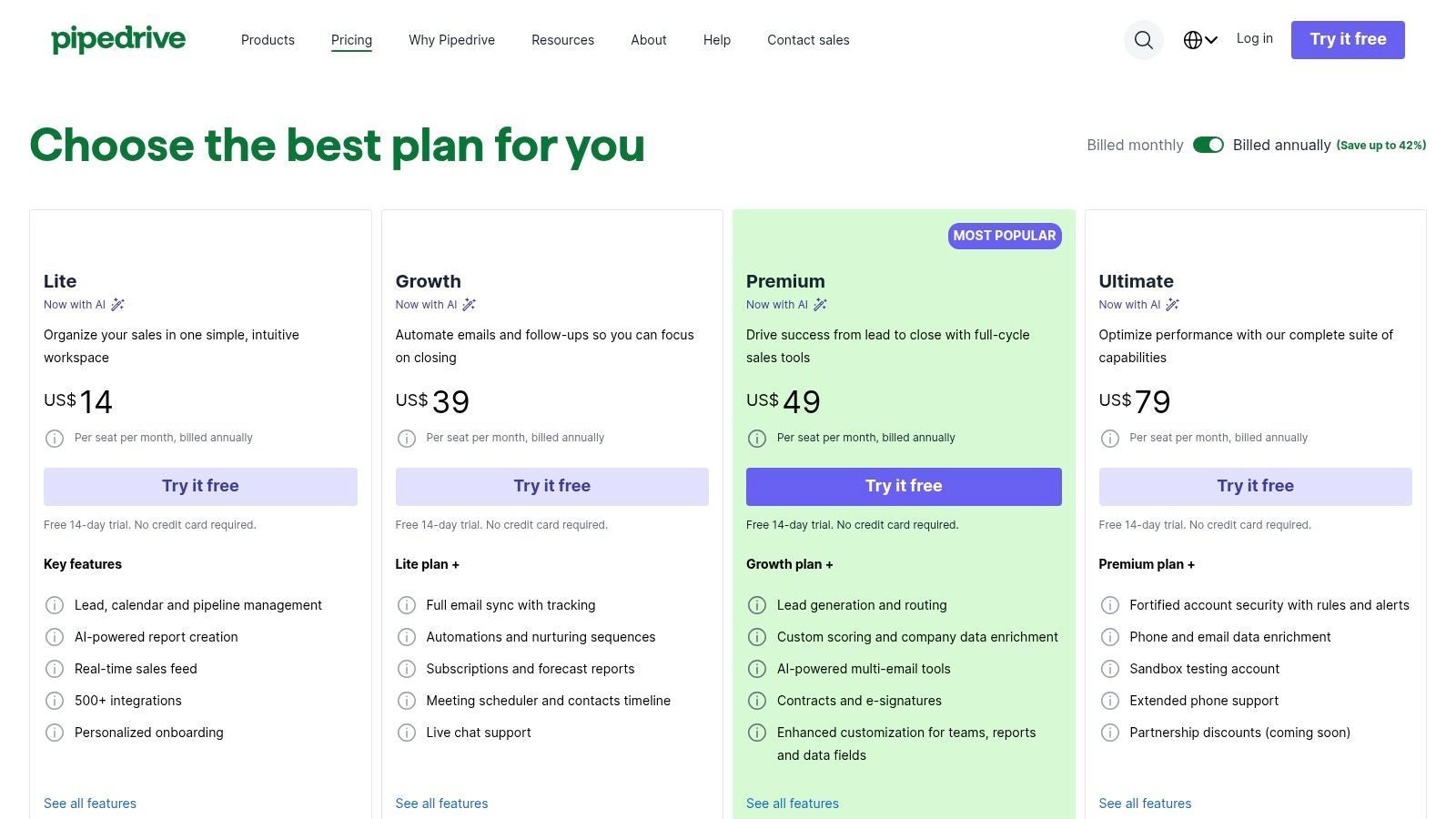
What truly sets Pipedrive apart is its intuitive, drag-and-drop interface, which is famous for its ease of use and quick adoption. Beyond its core pipeline management, it offers solid features like email sync and tracking, a meeting scheduler, and AI-assisted reporting. While it is highly sales-centric, its straightforward approach to contact and deal tracking makes it a powerful tool for any team that operates on a stage-based process.
Key Details & Pricing
- Best For: Small to mid-sized sales teams needing an easy-to-use, visually-driven CRM to manage their sales pipeline effectively.
- Pricing: Plans start at $14/user/month (Essential), $29/user/month (Advanced), $49/user/month (Professional), and $99/user/month (Enterprise). Add-ons for lead capture and campaigns are available.
- Pros: Highly intuitive user interface that is easy to adopt, clear and transparent pricing model with add-ons, excellent value for sales-focused workflows.
- Cons: Marketing and service features often require extra add-ons, making it less ideal for complex, multi-departmental CRM needs.
To maximize Pipedrive's effectiveness, it's crucial to fill your pipeline with high-quality leads, a process that can be streamlined by following some lead generation best practices.
Website: https://www.pipedrive.com/en/pricing
6. Nimble
Nimble carves out its niche as a relationship-focused CRM, making it one of the best contact management software choices for professionals who live in their inbox and on social media. Its core strength lies in automatically enriching contact profiles with data from social networks and web sources, providing a 360-degree view without manual data entry. This platform is designed to work seamlessly within Google Workspace and Microsoft 365, turning your existing tools into a more powerful, context-aware system.
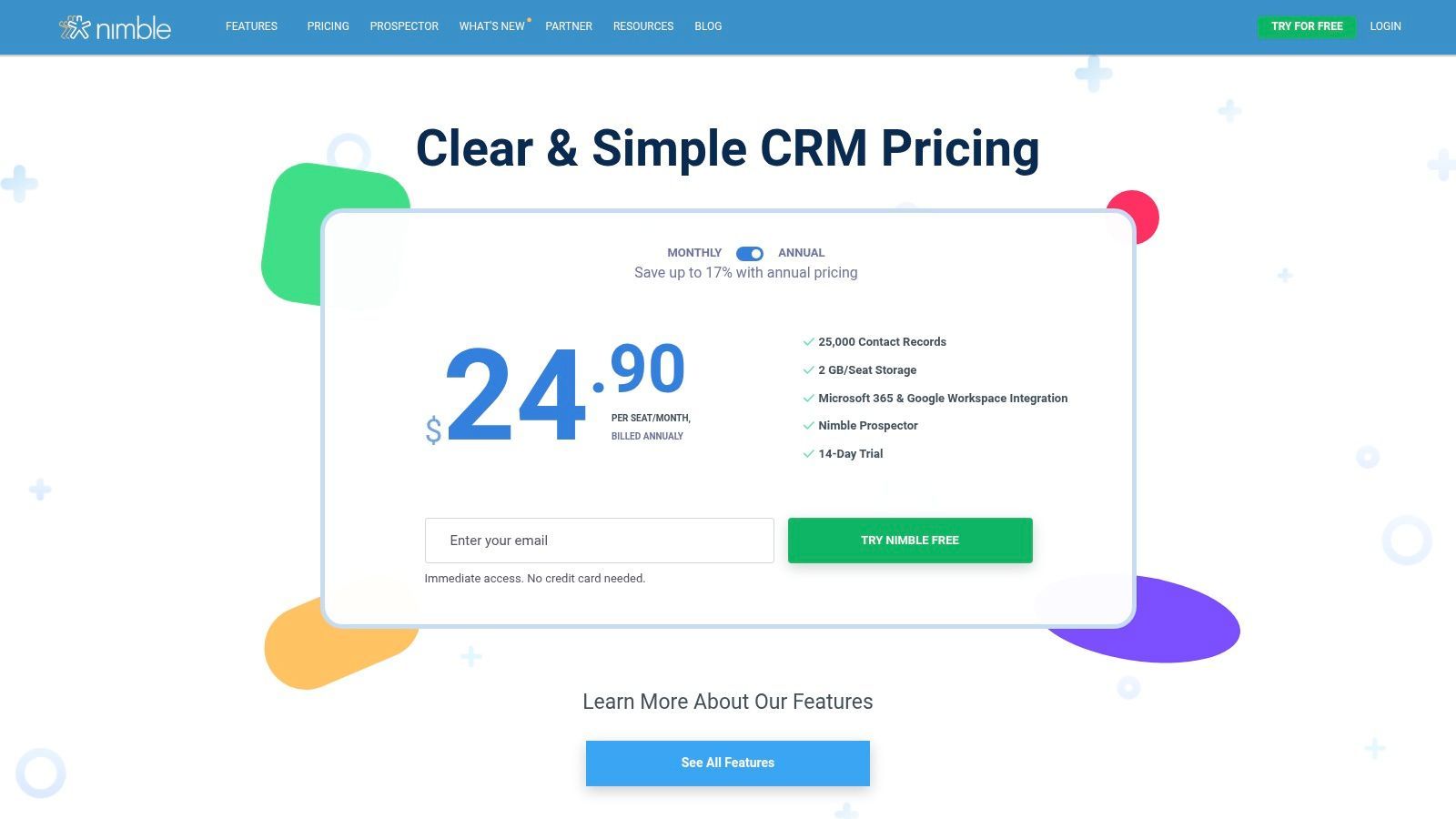
What truly sets Nimble apart is its lightweight and intuitive design, particularly its browser extension, Nimble Prospector. This tool allows you to build and enrich contact records on the fly from anywhere on the web, including LinkedIn. It focuses on simplifying workflows and providing actionable insights where you already work, rather than forcing you into a complex, standalone application. While it may lack the deep enterprise governance of larger platforms, its focus on practical, everyday relationship management is unmatched for small teams and solo professionals.
Key Details & Pricing
- Best For: Small teams and individuals who prioritize social selling and relationship-building directly within their email and browser workflows.
- Pricing: A single plan, Nimble Business, is offered at $29.90/user/month (or $24.90/user/month billed annually).
- Pros: Excellent contact enrichment and prospecting tools, lightweight and easy to maintain, affordable for SMB budgets.
- Cons: The single plan supplemented with paid add-ons for marketing or extra storage can become costly, and it has limited capabilities for complex enterprise workflows.
Website: https://www.nimble.com/pricing/
7. Streak (CRM inside Gmail)
Streak carves out a unique niche by transforming your Gmail inbox into a fully functional CRM, making it one of the best contact management software options for teams living in Google Workspace. Instead of toggling between tabs, it integrates directly into your email, allowing you to track contacts, deals, and projects within pipelines overlaid on your inbox. This eliminates context-switching and makes managing relationships a natural extension of your daily email workflow.
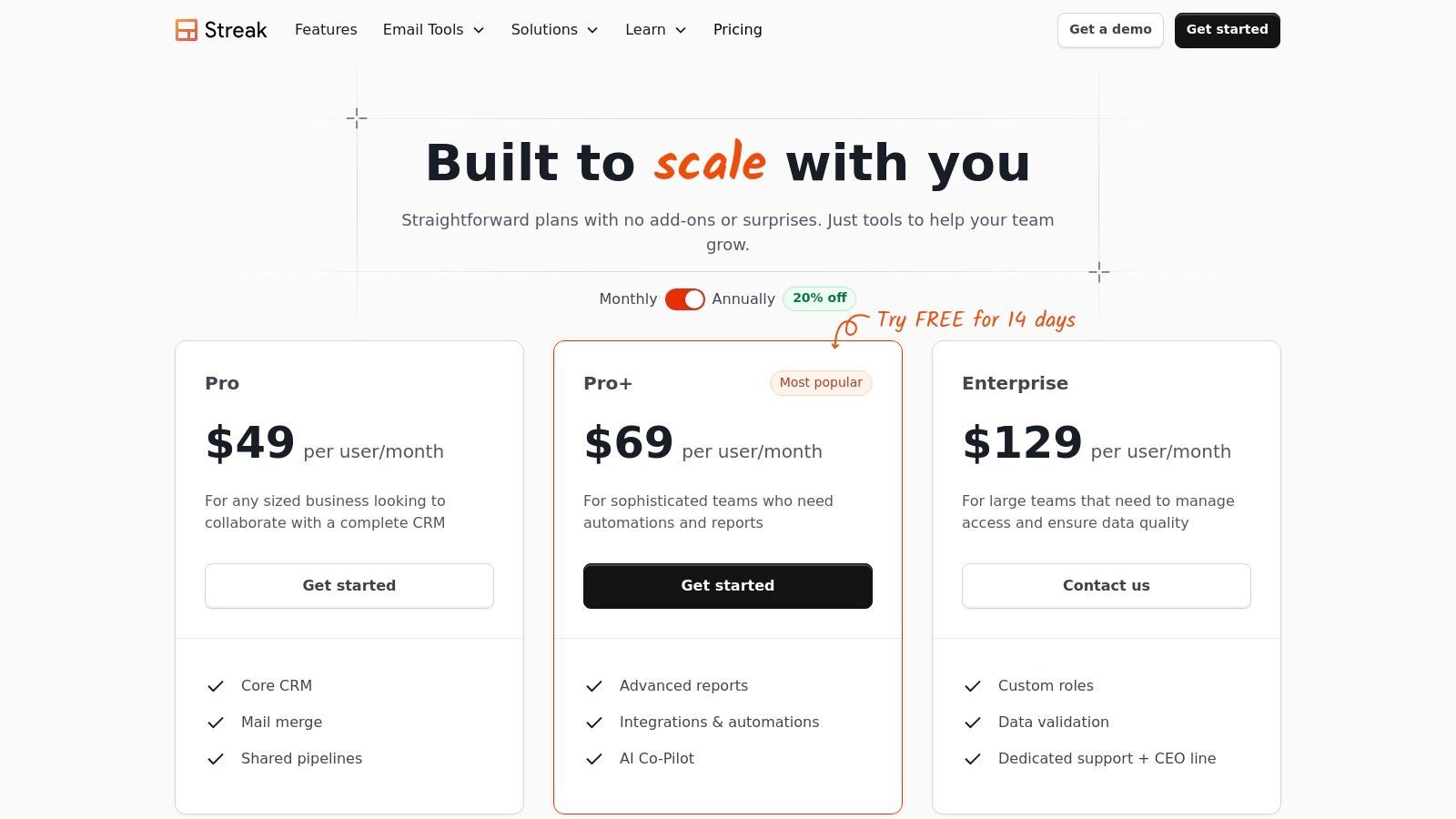
What makes Streak compelling is its simplicity and immediate utility. You can build and share pipelines, track email opens, and use mail merge features without ever leaving Gmail. This native integration is its greatest strength, offering a frictionless user experience for sales reps, recruiters, and project managers who rely heavily on email communication. While it may lack the standalone power of larger CRMs, its convenience for Google-centric teams is unmatched.
Key Details & Pricing
- Best For: Individuals and small teams who operate almost exclusively within Gmail and Google Workspace and need a simple, integrated CRM.
- Pricing: Offers a basic Free plan for personal use. Paid tiers start at $15/user/month (Solo), $49/user/month (Pro), and $129/user/month (Enterprise).
- Pros: Seamless Gmail integration with no context switching, easy to deploy and share, strong email tracking and mail merge tools.
- Cons: Limited functionality outside of the Google ecosystem, advanced features and integrations are locked behind higher-priced plans.
Website: https://www.streak.com/pricing
8. Contacts+
Contacts+ carves out its niche by focusing on one thing and doing it exceptionally well: unifying and cleaning your contacts. Rather than trying to be a full-blown CRM, it acts as a central hub that syncs, deduplicates, and enriches contact information across your Google, Apple, and Microsoft accounts. This approach makes it a powerful utility for anyone drowning in fragmented contact lists scattered across different platforms, creating a single source of truth.
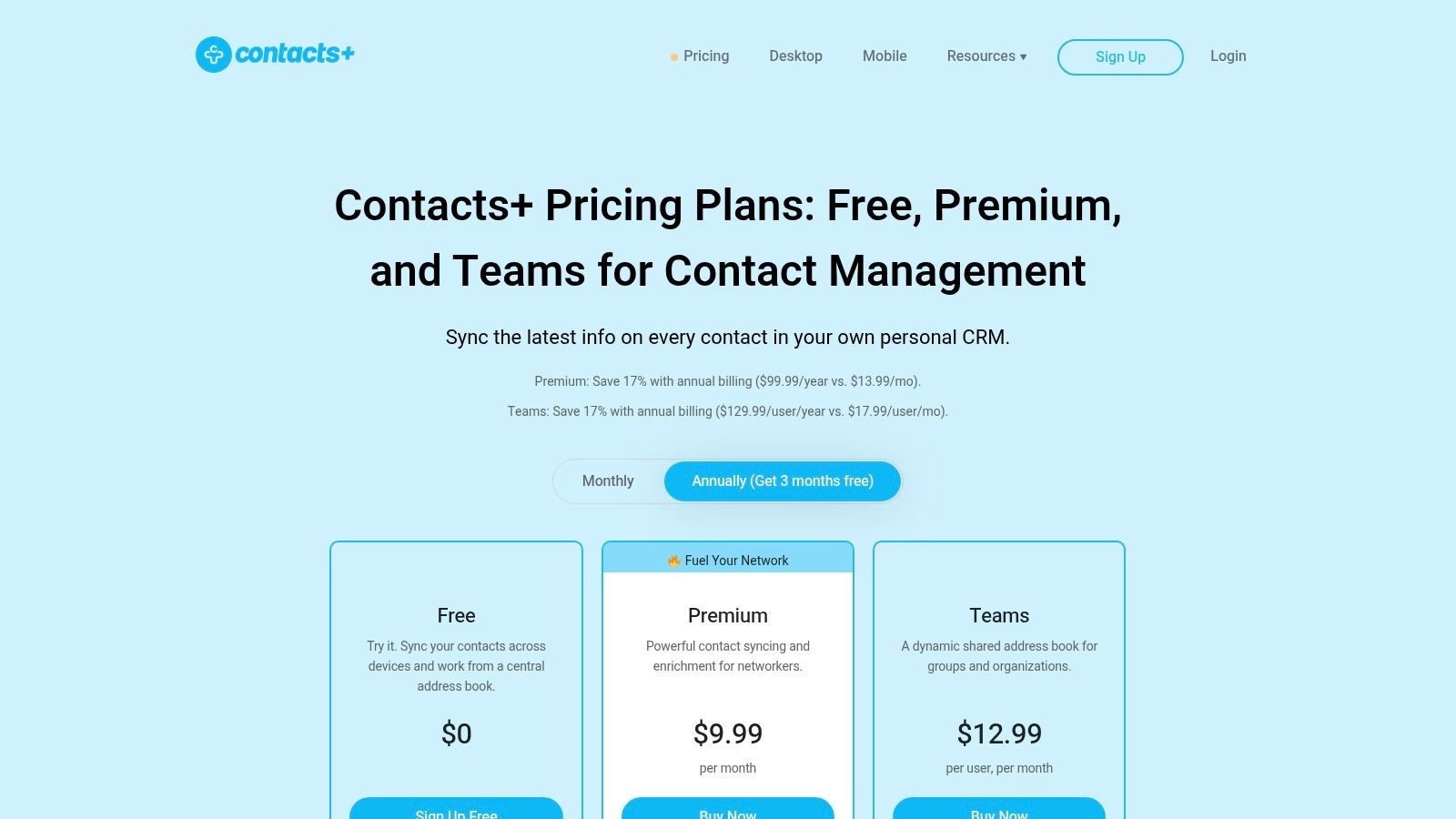
What makes Contacts+ a standout piece of contact management software is its simplicity and effectiveness. It automatically scans for duplicates and merges them, parses email signatures to update contact details, and allows for easy creation of shared address books for teams. This ensures everyone is working from the most accurate, up-to-date information without the complexity of a sales pipeline or deal tracking features, making it ideal for pure contact organization.
Key Details & Pricing
- Best For: Individuals and small teams who need to synchronize and clean up contacts across multiple platforms without the overhead of a full CRM.
- Pricing: Offers a Free plan for basic sync. Paid plans start at $9.99/user/month (Premium) and a $12.99/user/month (Teams) plan.
- Pros: Excellent at creating a single, clean contact database, fast cross-platform syncing, affordable plans for its core function.
- Cons: Not a sales CRM, so it lacks pipelines and forecasting tools. Lower-tier plans have limits on the number of accounts and contacts you can sync.
Website: https://www.contactsplus.com/pricing/
9. Cloze
Cloze carves out its niche as one of the best contact management software options by focusing on intelligent automation to maintain relationships. It operates like a personal assistant, automatically syncing emails, calls, calendars, and social media interactions to create a complete history for every contact without manual data entry. This "set it and forget it" approach is its greatest strength, ensuring no follow-up is ever missed.
What makes Cloze truly stand out is its AI-driven "Agenda," which proactively surfaces important contacts, prompts you to keep in touch, and reminds you of key deadlines. Instead of you digging through a database, Cloze tells you who to contact next and why. This is incredibly valuable for relationship-heavy roles like real estate agents, consultants, and financial advisors who depend on consistent, personalized outreach to stay top-of-mind.
Key Details & Pricing
- Best For: Solo professionals and small teams in relationship-driven industries who need an automated system to manage follow-ups.
- Pricing: Starts at $19.99/user/month (Pro). Business plans include $29.99/user/month (Silver), $39.99/user/month (Gold), and $49.99/user/month (Platinum).
- Pros: Exceptional automation reduces manual work, AI-powered reminders are highly effective, excellent mobile app experience, unifies all communication channels.
- Cons: Less suited for complex, multi-stage sales pipelines, and advanced team collaboration features require more expensive business tiers.
Website: https://www.cloze.com/pricing
10. Google Workspace Marketplace (Sales & CRM category)
The Google Workspace Marketplace offers a unique approach to contact management by functioning as a curated platform rather than a standalone app. For teams deeply embedded in the Google ecosystem, it provides a trusted source to find and deploy CRM and contact management tools that integrate directly into Gmail, Drive, and Sheets. This model allows businesses to extend their existing workflows with specialized tools, avoiding the need to switch between disconnected applications and centralizing data where it's already being used.
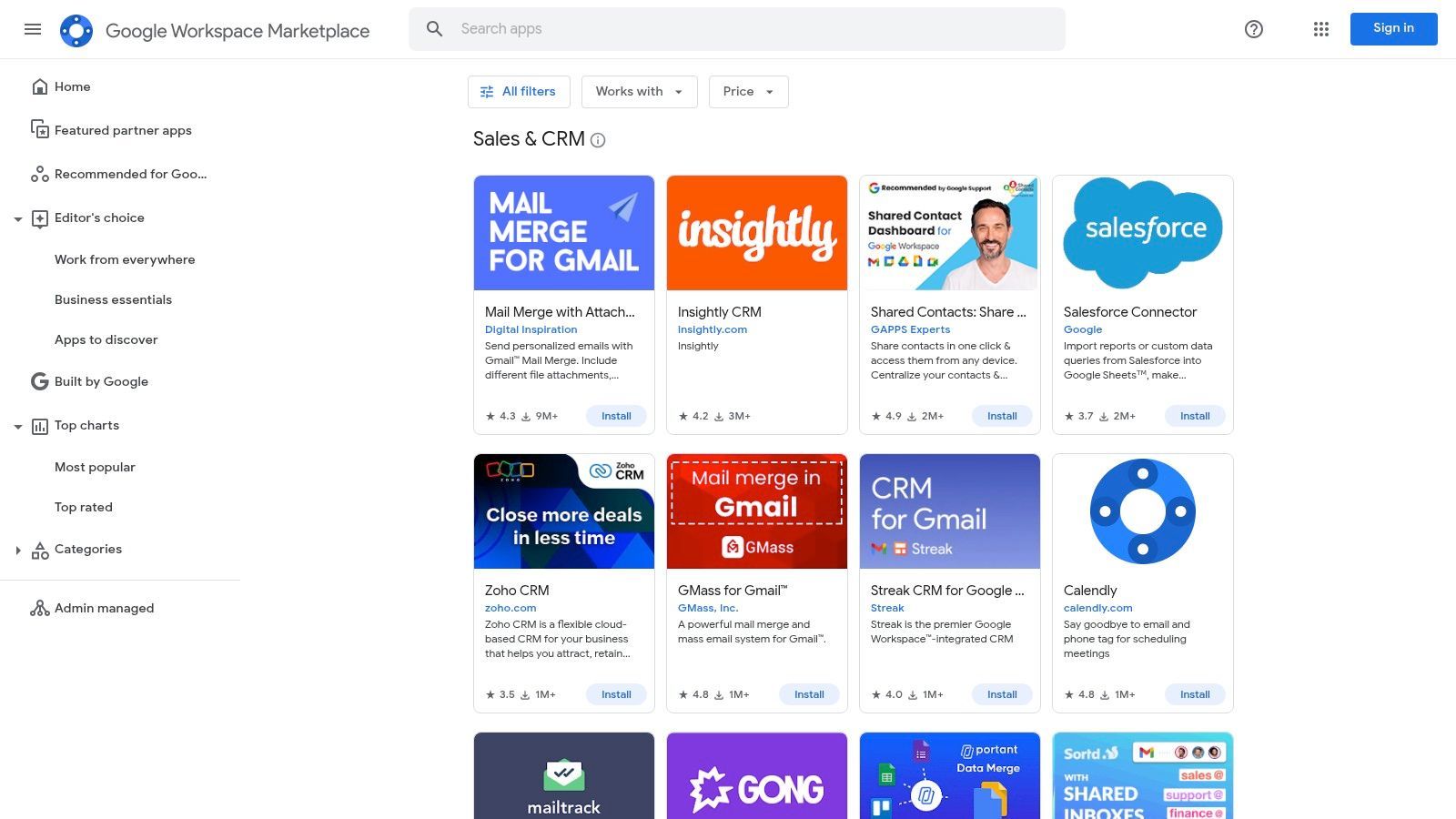
What makes the marketplace an essential resource is its focus on security and streamlined deployment. Each app is vetted by Google, and administrators can manage domain-wide installations and billing from a central console. This provides a secure way to find some of the best contact management software designed for Google Workspace, from simple contact organizers to full-fledged CRMs. While the quality and features vary between vendors, the marketplace is an excellent starting point for discovering a tool that perfectly fits your team's specific needs.
Key Details & Pricing
- Best For: Teams and organizations that operate heavily within Google Workspace and need a secure way to find and deploy integrated contact management solutions.
- Pricing: Varies widely, as the platform lists both Free and paid third-party applications with their own pricing models.
- Pros: One-stop shop for Google-integrated tools, simplifies deployment and billing for organizations, trusted source for security-vetted apps.
- Cons: Quality and support vary significantly by vendor, some apps require administrator permissions for domain-wide installation, and finding the perfect fit can require trial and error.
Website: https://workspace.google.com/marketplace/category/business-tools/sales-and-crm
11. Microsoft AppSource (Contact/Teams/Outlook add-ins)
Microsoft AppSource isn't a single software but a marketplace, making it a unique and powerful resource for organizations deeply embedded in the Microsoft 365 ecosystem. Instead of a one-size-fits-all solution, it offers a curated selection of contact management add-ins designed specifically for Outlook, Teams, and the broader Microsoft cloud. This allows businesses to find hyper-specialized tools, like shared contact lists or global directories, that integrate natively with their existing infrastructure, including Entra ID (formerly Azure AD) and Exchange.
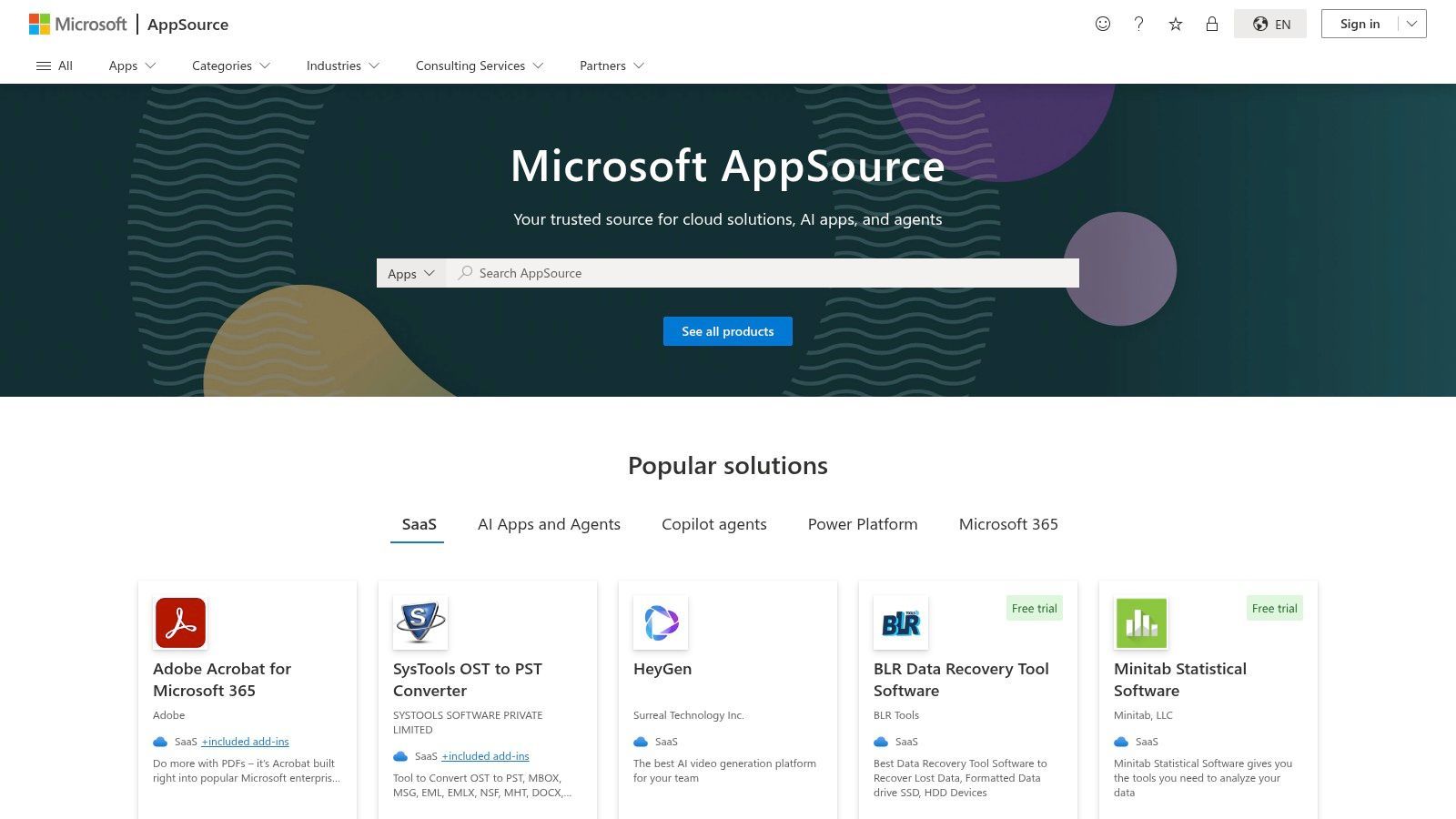
The primary advantage here is the seamless integration and centralized management. Admins can deploy apps organization-wide, and users benefit from a familiar interface and single sign-on capabilities. This approach is ideal for companies that prioritize security and a unified tech stack over standalone platforms. While it requires you to vet individual apps, AppSource is the definitive starting point for finding the best contact management software that feels like a natural extension of your Microsoft environment.
Key Details & Pricing
- Best For: Companies standardized on Microsoft 365, Teams, and Outlook needing natively integrated contact solutions.
- Pricing: Varies by app; includes Free, Trial, and paid subscriptions. Pricing is determined by individual third-party vendors.
- Pros: The best place to find Microsoft-native contact tools, smooth single sign-on and directory integration, ideal for Windows and Microsoft Teams-first environments.
- Cons: Feature sets vary widely by app and require trials, some add-ins may need additional server infrastructure or subscriptions.
Website: https://appsource.microsoft.com/
12. G2 – Contact Management Software category
While not a contact manager itself, G2's dedicated category for contact management software is an indispensable resource for research and comparison. It functions as a meta-tool, aggregating thousands of verified user reviews, ratings, and feature breakdowns across dozens of platforms. This peer-driven approach allows you to see how different tools perform in real-world scenarios, uncovering both strengths and weaknesses that marketing materials often gloss over.
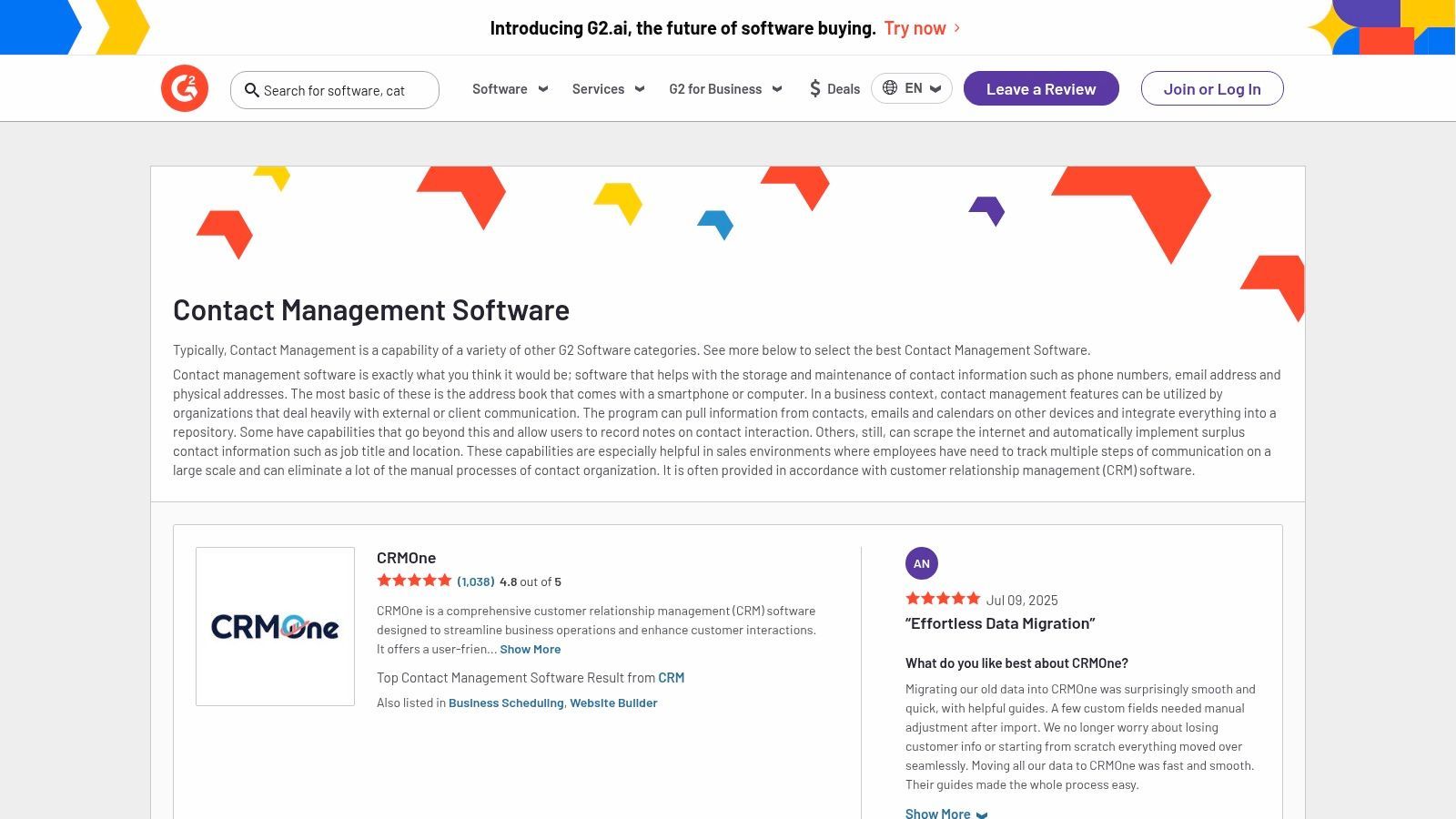
What makes G2 uniquely valuable is its Grid report, which visually maps out contenders based on market presence and user satisfaction. You can filter options by company size, industry, specific features, and pricing models to quickly shortlist the best contact management software for your unique needs. By reading detailed reviews, you can identify common pain points and discover how teams like yours are using a particular tool, making your final decision much more informed.
Key Details & Pricing
- Best For: Teams in the research phase looking to compare top platforms using authentic, peer-generated feedback and data.
- Pricing: Free to browse, compare, and read all user reviews. Vendors pay for sponsored placements and advanced profiles.
- Pros: Access to thousands of real user reviews, powerful comparison and filtering tools, up-to-date information on features and pricing.
- Cons: Not a direct purchasing platform, sponsored listings can influence initial visibility, and review quality can sometimes vary.
Website: https://www.g2.com/software/contact-management
Top 12 Contact Management Software Comparison
| Product | Core Features | User Experience / Quality | Value Proposition | Target Audience | Price Points & Plans |
|---|---|---|---|---|---|
| ProfileSpider | AI one-click scraping; up to 200 profiles/page; local data storage; CSV/JSON/Excel exports | Zero setup; intuitive profile management; offline access | Privacy-first; cost-effective credits; multi-format exports | Recruiters, Sales, Marketers, Researchers | Free to Power plans; credit-based; 30-day guarantee |
| HubSpot Sales Hub | Unified contact records; email sync; workflow automation; extensive integrations | Mature ecosystem; strong support; scalable | Robust CRM with free tier for growth | Solopreneurs to enterprises | Free + paid tiers; some add-ons extra |
| Salesforce Sales Cloud | Full contact/account management; app ecosystem; AI add-ons; mobile app | Highly customizable; powerful analytics | Enterprise-grade CRM with large app network | Mid to large businesses | Tiered pricing; can be costly |
| Zoho CRM | Pipeline visualization; automation; integrated apps; AI assistant on higher tiers | Feature-rich; customizable; may overwhelm new users | Cost-effective CRM for SMBs | SMBs and growing teams | Competitive tiers; AI on premium plans |
| Pipedrive | Visual pipelines; email sync; AI reporting; add-ons | Easy to adopt; clear pricing; sales-focused | Simple, sales-centric CRM | SMB sales teams | Tiered pricing; add-ons extra |
| Nimble | Contact enrichment; browser/email extensions; simple automation | Lightweight; affordable; social data enriched | Affordable relationship management | SMBs; Google/Microsoft users | Single plan + paid add-ons |
| Streak (Gmail CRM) | Gmail-native pipelines; mail merge; tracking; Chrome extension | No context switch; simple sharing | Gmail-integrated CRM | Google Workspace teams | Tiered subscriptions |
| Contacts+ | Multi-account sync; contact enrichment; shared address books | Fast sync; data quality focused | Cross-platform contact manager | Individuals and teams | Affordable tiers; limited CRM features |
| Cloze | Auto contact capture; AI reminders; unified communication | AI-driven nudges; good mobile use | Automation for professionals | Consultants, real estate, small biz | Tiered plans; advanced on business tiers |
| Google Workspace Market | Curated CRM/sales apps; admin install; security badges | Wide app choice; centralized billing | Google Workspace integrated tools | Google Workspace organizations | Free & paid app mix |
| Microsoft AppSource | Teams/Outlook contact apps; org-wide deployment; Azure AD integration | Native Microsoft ecosystem; SSO | Microsoft-first contact management | Microsoft 365/Teams users | Free, trial, and paid apps |
| G2 – Contact Mgmt | Software directory; user reviews; pricing info; filters | Peer-driven insights; discovery tool | Informed decision making | Buyers/researchers of contact tools | Free resource |
Build Your Contact Database the Modern Way
Choosing the best contact management software is a crucial first step toward streamlining your business operations. As we've explored, the market offers a diverse range of powerful platforms, from all-in-one CRMs like HubSpot and Salesforce to nimble, specialized tools like Streak and Nimble. The key takeaway is that the "best" software is the one that aligns perfectly with your team’s size, workflow, budget, and strategic goals.
However, selecting the right platform is only half the battle. A powerful contact management system is only as valuable as the data it contains. This is where a modern approach to data acquisition becomes a game-changer. Manual data entry is a bottleneck that introduces errors, drains productivity, and slows down your sales or recruitment cycles. Traditional data scraping tools often require coding skills and complex setup, making them inaccessible for most sales pros and recruiters.
From Selection to Implementation: Your Action Plan
To gain a competitive edge, pair your chosen CRM with an efficient data pipeline. This is where a no-code tool like ProfileSpider creates a massive advantage. Instead of manually copying information from LinkedIn, company websites, or professional networks, you can automate building a rich, accurate contact database in a fraction of the time.
Consider this easy workflow:
- Define Your Ideal Profile: Identify the key characteristics of your target leads or candidates.
- Automate Data Capture: Use a one-click tool like ProfileSpider to instantly extract profile data—including names, titles, and contact information—from any relevant online source.
- Integrate with Your CRM: Export this clean, organized data directly into your newly selected contact management software, whether it's Pipedrive, Zoho, or another platform.
By adopting this modern, two-part strategy, you bypass the initial data-entry grind and immediately populate your system with high-quality contacts. This allows your team to focus on what truly matters: building relationships, closing deals, and placing candidates.
Once you've built your contact database, the next step is to ensure you're pursuing the right opportunities. A well-structured system allows you to effectively segment and prioritize your contacts, but knowing who to engage with first is essential. Learning how to properly qualify your leads will transform your raw data into a predictable revenue stream. To go deeper on this, you can master your lead qualification process and ensure your team's efforts are always directed at the most promising prospects.
Ultimately, the goal is to create a seamless ecosystem where high-quality data flows effortlessly into a system designed to help you leverage it. Choose your contact management software wisely, but don't stop there. Embrace modern, no-code tools to build your database intelligently, and you’ll unlock a new level of efficiency and growth.



